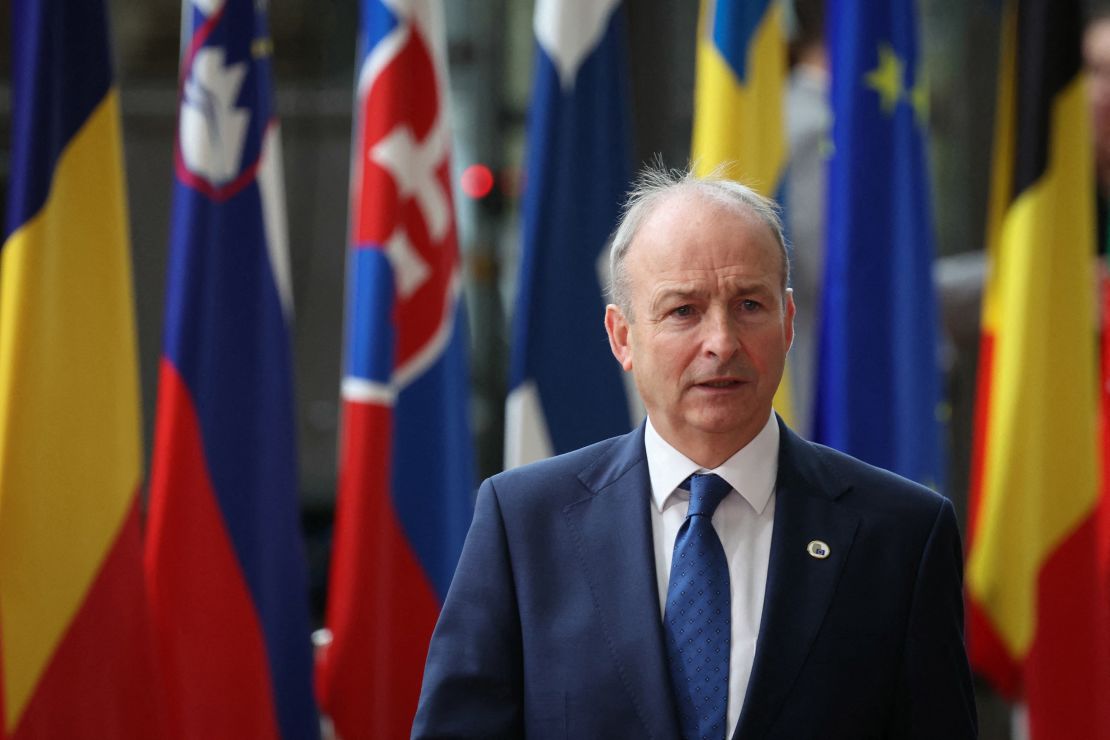CNN
—
Ireland appears closer to passing a bill that will ban trade with illegal Israeli settlements in occupied territories in the West Bank, sparking sharp criticism from US officials who have signaled the move could harm Dublin’s relationship with Washington.
US Ambassador to Israel Mike Huckabee accused Ireland of “diplomatic intoxication” Tuesday in a sharp rebuke of the draft legislation, invoking a derogatory stereotype of the Irish people.
“Did the Irish fall into a vat of Guinness & propose something so stupid that it would be attributed to act of diplomatic intoxication? It will harm Arabs as much as Israelis. Sober up Ireland!,” Huckabee said in a post on X.
Huckabee’s comment comes after the Irish Committee on Foreign Affairs and Trade held pre-legislative scrutiny meetings this week to discuss the bill, which has drawn support from pro-Palestinian lawmakers and campaigners and criticism from several Jewish organizations and some in the Jewish community.
CNN has reached out to the Irish Foreign Ministry for comment on Huckabee’s post.
In an apparent attempt to deflect criticism, Micheál Martin, the Taoiseach, or prime minister, has said enacting the bill would be “largely symbolic,” as it aims to apply pressure on Israel to end the war in Gaza.
“This is one element of the government’s approach to the devastating violence and the appalling humanitarian situation in Gaza and the West Bank,” Martin said in April.

On Monday, the chair of the Jewish Representative Council of Ireland, Maurice Cohen, called the bill “a performance of misguided effort.”
“It won’t bring two states closer, but it might drive Jewish communities here in Ireland further into fear and isolation,” Cohen said.
Republican Senator Lindsay Graham also weighed in on the bill, saying Tuesday that he hopes “Ireland will reconsider their efforts to economically isolate Israel.”
“I do not believe these efforts would be well received in the United States and they certainly would not go unnoticed,” Graham said on X.
If the legislation – Israeli Settlements in the Occupied Palestinian Territory (Prohibition of Importation of Goods) Bill 2025 – passes in Ireland’s Oireachtas, or parliament, it will mark the first time a European Union member state has enacted such a law. The bill was first tabled in 2018 and has regained momentum since Israel’s highly destructive military campaign in Gaza following the Hamas attacks of October 7, 2023. More than 58,000 people have been killed in Gaza since the start of the war, according to the Palestinian Ministry of Health.
The International Court of Justice (ICJ) has said Israel’s settlement policies and exploitation of natural resources in the occupied Palestinian territories breaches international law. Israeli Prime Minister Benjamin Netanyahu called the ICJ’s ruling a “decision of lies.”
Solidarity with the Palestinian cause is longstanding across most of Irish society and politics, with many in Ireland identifying a shared historical experience of subjugation by an occupying state.
Ireland became the first EU member state to call for Palestinian statehood in 1980, actualized in its formal recognition of the State of Palestine in May 2024.
Israel closed its embassy in Dublin in December 2024, with Israel’s Foreign Minister Gideon Sa’ar accusing Ireland of “extreme anti-Israel policies.”
Ireland has long rejected any accusation that it is anti-Israel. “Ireland is pro-peace, pro-human rights and pro-international law,” then-PM Simon Harris said in response to the Israeli embassy closure.
“Ireland wants a two-state solution and for Israel and Palestine to live in peace and security. Ireland will always speak up for human rights and international law. Nothing will distract from that,” he said.
CNN’s Kathleen Magramo and Eugenia Yosef contributed reporting.
